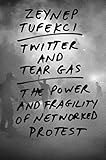Twitter and tear gas : the power and fragility of networked protest / Zeynep Tufekci.
Materialtyp: TextSpråk: Engelska Förlag: New Haven : Yale University Press, [2017]Datum för upphovsrätt: ©2017Beskrivning: xxxi, 326 pages 24 cmInnehållstyp:
TextSpråk: Engelska Förlag: New Haven : Yale University Press, [2017]Datum för upphovsrätt: ©2017Beskrivning: xxxi, 326 pages 24 cmInnehållstyp: - text
- unmediated
- volume
- 0300215126
- 9780300215120
- 302.231 23/swe
- HM742 .T84 2017
- Bs
| Exemplartyp | Aktuellt bibliotek | Hyllsignatur | Status | Förfallodatum | Streckkod |
|---|---|---|---|---|---|
| Bok (Hemlån) | Campus Karlskrona | 302.2 | Tillgänglig | 080041487710 |
Includes bibliographic references and index.
A firsthand account and incisive analysis of modern protest, revealing internet-fueled social movements' greatest strengths and frequent challenges To understand a thwarted Turkish coup, an anti-Wall Street encampment, and a packed Tahrir Square, we must first comprehend the power and the weaknesses of using new technologies to mobilize large numbers of people. Tufekci explains the nuanced trajectories of modern protests-how they form, how they operate differently from past protests, and why they have difficulty persisting in their long-term quests for change. Tufekci speaks from direct experience, combining on-the-ground interviews with insightful analysis. She describes how the internet helped the Zapatista uprisings in Mexico, the necessity of remote Twitter users to organize medical supplies during Arab Spring, the refusal to use bullhorns in the Occupy Movement that started in New York, and the empowering effect of tear gas in Istanbul's Gezi Park. These details from life inside social movements complete a moving investigation of authority, technology, and culture-and offer essential insights into the future of governance.
Imported from: zcat.oclc.org:210/OLUCWorldCat (Do not remove)
